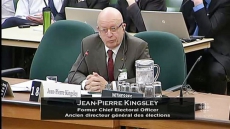OTTAWA — The Ontario Provincial Police have dropped an investigation into the RCMP's destruction of gun registry data, saying the alleged offences no longer exist under a back-dated, retroactive Conservative law passed last spring.
Documents filed in court by the federal information commissioner's office include a letter from the OPP that lays out four potential offences by the RCMP when the national police force destroyed long gun registry records in 2012.
The OPP letter, dated Sept. 22, details at length how Conservative changes buried in a highly controversial omnibus budget bill last spring close off every avenue for investigation of the alleged RCMP offences.
"After giving the provisions described above detailed consideration, I am of the view that the retrospective aspect of the Bill C-59 amendments completely remove any criminal liability in relation to deletion of long-gun registry data by the RCMP," writes OPP Det. Supt. Dave Truax.
The bill was passed just prior to the House of Commons rising for the summer.
Parliament was subsequently dissolved in early August when Prime Minister Stephen Harper triggered the current election campaign.
Information commissioner Suzanne Legault has launched a constitutional challenge of the government's retroactive changes to the legislation, called the Ending the Long-gun Registry Act, or ELRA.
Legault issued a special report to Parliament last spring laying out how the RCMP knowingly destroyed registry files, even though it knew those records were part of an active investigation under the Access to Information Act, and even though the federal public safety minister had assured Legault's office that the Mounties would abide by the access law and preserve the data.
Legault recommended charges be laid and Justice Minister Peter MacKay referred the matter to the public prosecutors' office on May 6, but the following day the government tabled an omnibus bill that retroactively wiped the offences from the legal code.
The government also back-dated the changes to when the original bill to kill the gun registry was tabled in Parliament, months before it actually passed into law, wiping out "any request, complaint, investigation, application, judicial review appeal or other proceeding" related to the final six months of the registry's legal existence.
The OPP letter states that it was looking into three possible offences under the Access to Information Act and one criminal offence, mischief to computer data.
Word of the dropped police investigation came Tuesday as a large group of Canadian academics published an open letter to Prime Minister Stephen Harper saying the retroactive legal change "will be judged in the court of public opinion: citizens will be justifiably alarmed that their government has taken actions that have profound, negative implications for the practice of Canadian democracy."
The letter, signed by some 80 academics, states that "a government should not decriminalize its own actions if they were illegal at the time they were committed. This requirement precludes laws that are retroactive as they would re-write history."
Legault has said the back-dated legal changes — coming in the face of an active investigation and a finding of wrongdoing by her office — set a "perilous precedent" that could allow future governments to retroactively rewrite laws on everything from spending scandals to electoral fraud.
NDP Leader Tom Mulcair at the time called the changes "banana-republic behaviour" but parliamentary procedure experts said the retroactive law, while unorthodox, could not be stopped, and it received royal assent on June 23.
Expert affidavits filed in Ontario Superior Court by Legault's office question Parliament's power to enact laws that retrospectively infringe on Canadians' quasi-constitutional right to government information.
"Virtually all formulations of the rule of law principle — in Canada and elsewhere in peer common law jurisdictions — include the idea that laws should be prospective rather than retrospective or retroactive," says the 87-page affidavit by law professor Lorne Sossin of York University's Osgoode Hall.
"The reasons for this are obvious. Imagine if a government that had acted corruptly could simply have legislation passed retrospectively altering the consequences of rules by which it operated so as to make illegitimate actions legitimate."
The Supreme Court of Canada has ruled that criminal punishments cannot be changed retroactively, but hasn't looked at the notion of retroactively absolving an act that was criminal at the time of the offence.
Law professor Jamie Cameron of the University of Toronto notes in his affidavit that the Supreme Court made access to government information a quasi-constitutional right in 2010.
"In doing so, the Court stated its commitment to 'open government,' declaring that 'access to information in the hands of public institutions can increase transparency in government, contribute to an informed public, and enhance an open and democratic society.'"


